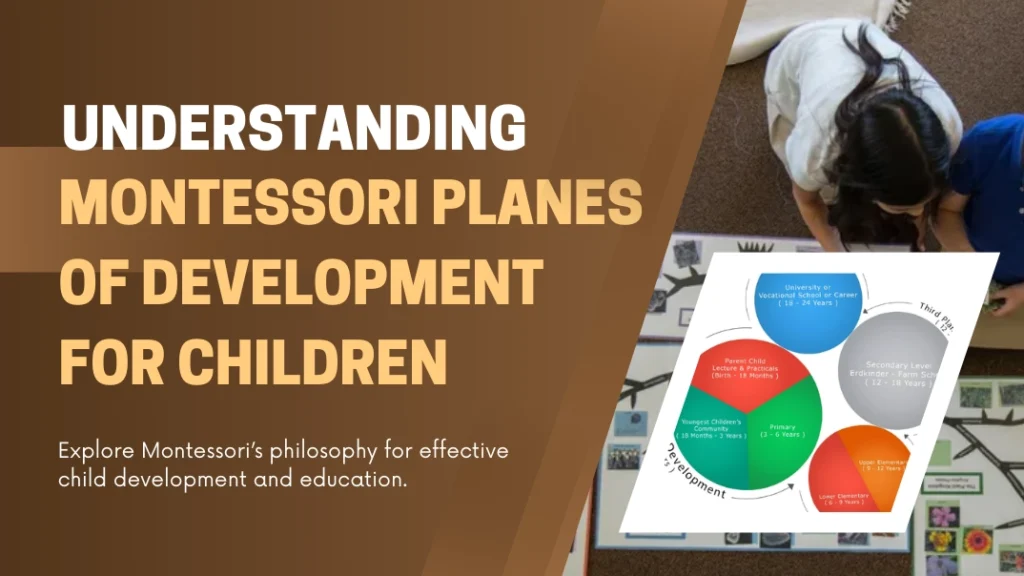子どもは皆、段階的に成長しますが、多くの親や教育者は、こうした変化を理解するのに苦労しています。従来の教育では、発達を一直線に捉え、年齢の異なる子どもに同じ方法を適用する傾向があります。しかし、発達段階の異なる子どもたちは、それぞれ独自のニーズ、学習スタイル、そして課題を抱えています。これらの段階を理解しなければ、意図せず子どもたちの自然な成長を妨げてしまう可能性があります。
幼児にティーンエイジャーと同じ方法で教えようとするのは危険です。幼い子どもは感覚体験と反復を通して学びますが、思春期の子どもはアイデンティティと自立に焦点を当てます。こうした自然な変化を無視すると、子どもはイライラしたり、やる気を失ったり、理解できなくなったりすることがあります。だからこそ、 モンテッソーリ発達段階 は不可欠です。これにより、適切なタイミングで適切な環境とガイダンスを提供できるようになります。
子どもの発達研究のパイオニアであるマリア・モンテッソーリは、子どもが6年間という明確な段階を経てどのように成長し、学ぶかを説明した「4つの発達段階」を特定しました。幼児期の「吸収する心」から青年期の「自立心」の芽生えまで、それぞれの段階は子どもの変化するニーズを明らかにします。これらの原則を適用することで、親や教育者は子どもの自然な発達を支える学習体験を作り出すことができます。
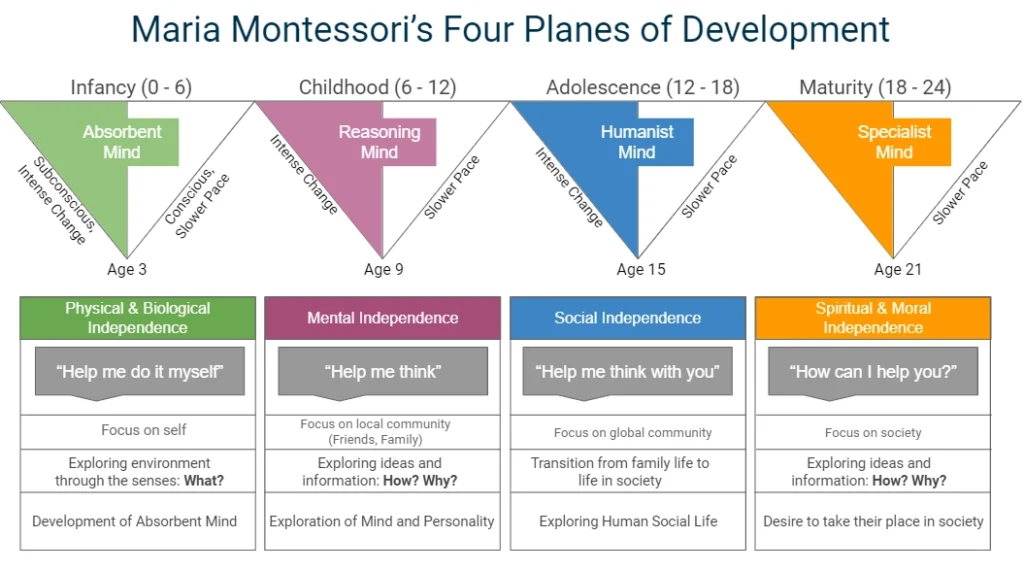
モンテッソーリ発達段階とは何ですか?
モンテッソーリ発達段階は、マリア・モンテッソーリの教育哲学における重要な概念であり、子どもの成長が連続的で直線的な過程ではなく、明確な段階を経て進むことを説明しています。学習を着実なプロセスとして扱う従来の教育システムとは異なり、モンテッソーリの4つの発達段階は、子どもが急速な変容期とそれに続く安定期を経験することを認識しています。モンテッソーリが特定したこれらの4つの発達段階はそれぞれ、子どもの知的、情緒的、そして社会的な成長を形作る上で重要な役割を果たします。
モンテッソーリの4つの発達段階を理解する
マリア・モンテッソーリは、子どもたちが自然に学び、環境に適応していく様子を観察し、モンテッソーリの4つの発達段階という概念を提唱しました。彼女は、子どもたちが約6年ごとに大きな発達の転換期を迎え、それが思考、情報の吸収、そして世界との関わり方に大きな影響を与えることを発見しました。
モンテッソーリが提唱した発達段階はそれぞれ、心理的および身体的に重要な変化を表しています。これらの段階は、知識の獲得、人格形成、感情的な回復力、そして自立心を育むことに重点を置いています。
モンテッソーリの 4 つの発達段階は次のとおりです。
- 発達の第一段階(0~6歳) – 無意識と意識の両方で夢中になる時期。子どもたちは「吸収力のある心」を通して、自然と学び始めます。感覚体験、言語習得、運動発達に重点が置かれます。
- 第2発達段階(6~12歳) – 推論する心の段階で、子どもたちは原因と結果を理解し、想像力を発達させ、高度な社会性を獲得しようとします。
- 発達の第3段階(12~18歳) – 思春期の若者が感情的な成長、自己アイデンティティの形成、自立性の向上を経験する変革段階。
- 第4発達段階(18~24歳) – 若者が目的意識を磨き、社会における自分の役割を見つける、成熟と社会的責任の時期。
これらの段階は、各段階の固有の特徴と重なり合う移行を示すモンテッソーリ発達段階チャートで最もよく視覚化されます。
モンテッソーリ教育において4つの発達段階が重要な理由
モンテッソーリ教育法の基盤となるモンテッソーリ理論は、学習環境の設計方法や、年齢に応じた子どもの指導方法に影響を与えています。それぞれの発達段階にはそれぞれ異なるニーズがあり、モンテッソーリ教育法はそれに応じて教育方法を調整します。
- モンテッソーリ教室における発達の第一段階子供たちは感覚豊かな教材を使って実践的な学習に取り組み、概念を自然に探求します。
- モンテッソーリ発達段階の第二段階学習はより抽象的になり、ストーリーテリング、グループワーク、研究に基づく学習を通じて好奇心と問題解決が促進されます。
- モンテッソーリ環境における発達の第3段階 現実世界での経験、見習い制度、感情的知性の育成に重点を置いています。
- 発達の第4段階モンテッソーリ哲学 若者を自立、リーダーシップ、そして重要な意思決定へと導くことに重点を置いています。
モンテッソーリの発達段階 vs. 伝統的な教育モデル
従来の教育では画一的なアプローチがしばしば適用されますが、モンテッソーリ発達段階は、子どもたちが 発達に適した学習体験従来の学校では、6歳児はじっと座って体系的な授業に集中することを期待する傾向がありますが、モンテッソーリ教育では、この時期は探求と運動の時期であると考えています。同様に、多くの高校では厳格なカリキュラムに重点を置いていますが、モンテッソーリ教育の第三発達段階では、思春期を自己発見と感情の変化の時期と捉え、より柔軟で経験に基づいたアプローチが求められます。
モンテッソーリの 4 つの発達段階に従うことで、教育者と保護者はあらゆる段階で子供たちをよりよくサポートし、学習への愛、自信、そして強い自立心を育むことができます。
| 側面 | モンテッソーリ発達段階 | 伝統的な教育モデル |
|---|---|---|
| 学習へのアプローチ | 子ども主導の実践的な体験に基づく学習 | 教師主導、構造化されたレッスン、暗記重視 |
| 開発段階 | 独自のニーズを持つ4つの異なる平面を認識する | 学習を継続的かつ標準化されたプロセスとして扱う |
| 初めての飛行機(0~6歳) | 感覚の探求、運動、自立に焦点を当てる | 体系的な学習、静かに座ること、聞くことに重点を置く |
| セカンドプレーン(6~12歳) | 想像力、推論力、グループでの協力を促します | 個人の学業成績、テスト、成績に焦点を当てる |
| サードプレーン(12~18歳) | 自己認識、感情の成長、現実世界での経験をサポートします | 多くの場合、厳格で試験中心であり、感情的な成長はあまり重視されない |
| 第4層(18~24歳) | 若者を自立、リーダーシップ、社会的責任へと導きます | 標準化された大学教育を通じて学生をキャリアに備えさせる |
| 教師の役割 | 子どもの自然な成長を尊重し、促進者およびガイドとして行動する | インストラクターとして活動し、標準化されたカリキュラムを提供する |
| 学習における柔軟性 | パーソナライズされた自分のペースでの学習を奨励します | 固定されたカリキュラムとスケジュールに従う |
| 評価方法 | 観察評価、自己評価、プロジェクトベースの学習 | 標準化されたテストと成績 |
この比較は、モンテッソーリ発達段階が従来の教育モデルよりも柔軟で子ども中心のアプローチを提供していることを強調しています。これらの違いを理解することで、親や教育者は、子どもの自然な成長を最もよくサポートする学習環境を判断できます。
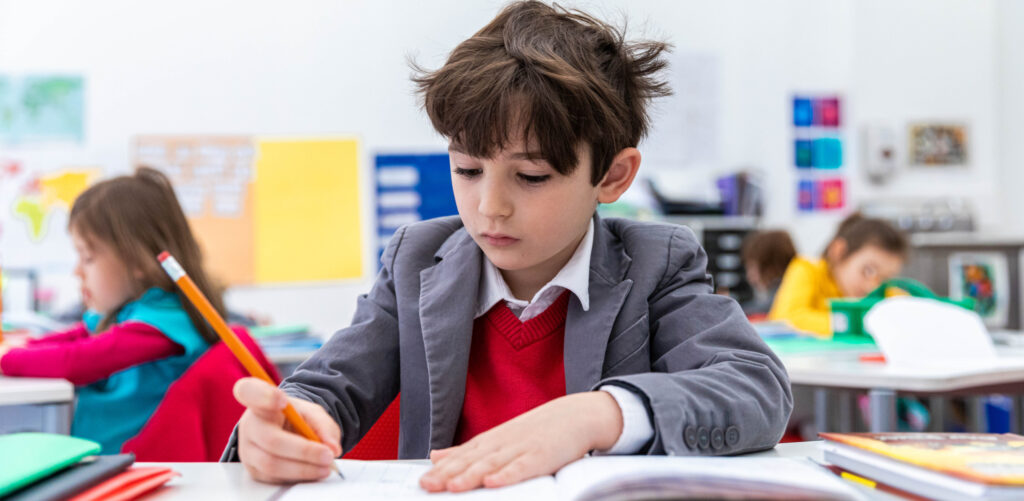
発達の第一段階(0~6歳) – 吸収力のある心
モンテッソーリは、生後から6歳までの発達段階を、集中的な感覚探索、無意識の学習、そして基礎的なスキル構築の段階と定義しています。マリア・モンテッソーリは、この段階を「吸収する心」と呼びました。これは、子どもたちが自然と、そして努力せずに周囲から情報を吸収するからです。
この段階は 2 つのサブフェーズに分かれています。
- 無意識の吸収(0~3歳) 子供は積極的に気づかずに環境から情報を吸収します。
- 意識的な吸収(3~6歳) 子どもは意図的に環境と関わり始め、運動能力、言語能力、自立心を磨いていきます。
モンテッソーリ教育における発達の第一段階の主な特徴
1. 感覚に基づく学習
- 子どもたちは、触覚、視覚、嗅覚、味覚、聴覚といった感覚を通して学びます。
- モンテッソーリ教室では、感覚知覚を洗練させるために 感覚材料 テクスチャ付きオブジェクト、サウンドシリンダー、カラータブレットなど。
- モンテッソーリのピンクタワーとノブ付きシリンダーは、子供たちの空間認識力と協調性を養うのに役立ちます。
2. 言語の習得と発達
- この段階では、脳は言語に対応できるように配線されており、子どもたちは苦労せずに単語、文の構造、発音を習得します。
- モンテッソーリは文字名の前に音声を導入し、子どもたちが音と書かれた記号を関連付けられるようにします。
- ストーリーテリング、音楽、会話が豊富な環境は語彙と言葉によるコミュニケーションを強化します。
3. 運動能力の発達
- 身体活動は脳の発達に不可欠です。
- パズル、ひも通し、ビーズ通しなどのモンテッソーリ教材は、細かい運動能力を磨きます。
- 木登り、バランスをとる、線の上を歩くなどの粗大運動活動は、子どもの協調性と筋力を養うのに役立ちます。
4. 自立心と実践的な生活スキルの育成
- モンテッソーリ教室では、実践的な生活活動を通じて自立を促します。
- 子どもたちは、水を注ぐ、シャツのボタンをかける、靴ひもを結ぶ、おやつを準備するといった日常的な作業を学びます。
- これらの活動は自信、集中力、責任感を高めます。
発達の第一段階における教育アプローチ モンテッソーリ
マリア・モンテッソーリは、この段階の子どもたちに、自由に動き、選択し、実践的な経験を積ませることを重視しました。モンテッソーリ教育の環境には以下のようなものがあります。
- 自立を促す子供サイズの家具。
- 安心感を生み出す、整然とした構造化された教室。
- 子どもたちが自分のペースで課題に集中できる、中断のない作業サイクル。
- 習熟するまで自由に探索し、活動を繰り返すことができます。
この段階では、知的、社会的、感情的な発達の基盤が築かれ、子どもたちが自信、好奇心、そして生涯にわたる学習への愛を身につけることができます。
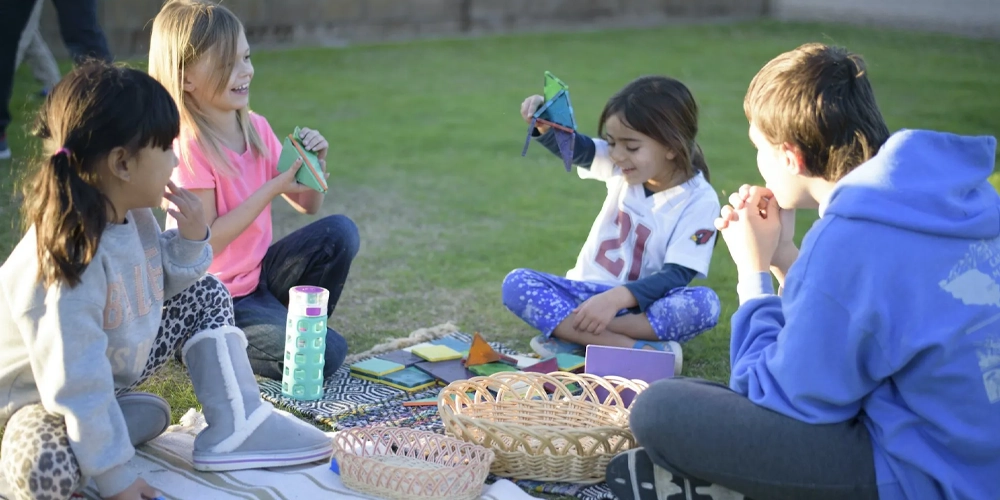
発達の第2段階(6~12歳) – 理性的な心
モンテッソーリ教育における発達の第二段階(6歳から12歳)に入ると、子どもたちは情報の吸収から疑問や推論へと移行します。モンテッソーリはこの段階を「推論する心」と呼び、子どもたちが論理的思考、想像力、そして道徳的認識を発達させる時期だとしています。
感覚体験を通して学ぶ低年齢の子どもとは異なり、6~12歳の子どもは、知的な刺激、問題解決、現実世界とのつながりを切望しています。
モンテッソーリ教育における第2発達段階の主な特徴
1. 具体的な思考から抽象的な思考への移行
- 子どもたちは、実践的で具体的な学習から、より抽象的な推論へと移行します。
- 彼らは暗記の域を超えて、数学的概念、科学的原理、歴史的出来事を理解し始めます。
- モンテッソーリでは、数学のビーズチェーンなどの教材を使用して、具体的な学習と抽象的な思考を結び付けます。
2. 強い好奇心と想像力
- この段階では、子どもたちはあらゆることに対して「なぜ」や「どのように」という質問をします。
- 彼らは強い想像力を発達させ、科学、地理、文学の概念を視覚化するのに役立ちます。
- モンテッソーリ教育では、好奇心を刺激するために、物語を語ったり、探究プロジェクトを行ったり、自由な議論をしたりすることを奨励しています。
3. 道徳意識と社会の発達
- この段階の子供たちは公平性、正義、倫理的な行動をより意識するようになります。
- 彼らは強い友情を築き始め、協力し、対立を解決し、チームとして働くことを学びます。
- チームワークとリーダーシップのスキルを強化するために、グループベースの学習が推奨されます。
4. 研究と探検への愛
- 子どもたちが物理的なやりとりを通じて探索する最初の平面とは異なり、第 2 平面の子どもたちは知的な発見を楽しみます。
- モンテッソーリは、宇宙、人生、人類の進歩についての感動的な物語である「グレートレッスン」を通じてこれを育みます。
- 研究に基づくプロジェクトでは、子どもたちは興味のあるテーマを深く掘り下げて、暗記ではなく調査を通じて学ぶことができます。
発達の第2段階における教育アプローチ モンテッソーリ
子どもの知性と社会的な好奇心を育むために、この段階のモンテッソーリ教育では次のことに重点を置いています。
- ストーリーテリング、リサーチ、クリエイティブプロジェクトを通じた学際的な学習。
- 現地見学や実地実験などの体験学習。
- 社会的スキルとリーダーシップスキルを強化するための共同グループワーク。
- テストと採点は最小限に抑え、暗記学習ではなく習得に重点を置きます。
この段階では、子どもたちは問題解決能力、批判的思考力、そして大人になっても続く知識への深い愛情を育みます。
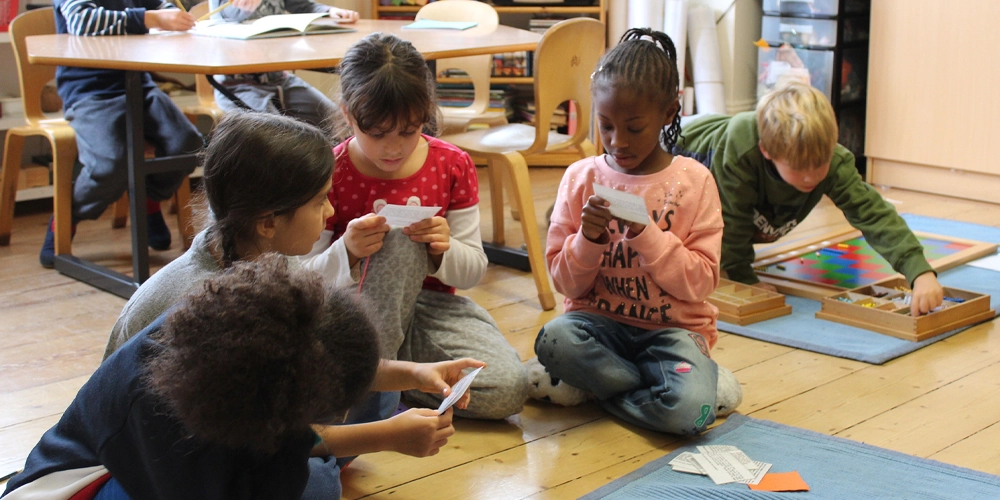
発達の第3段階(12~18歳) - 青年期とアイデンティティ形成
モンテッソーリは、12歳から18歳までの思春期を、感情面、社会面、認知面において大きな変容が起こる時期と定義しています。マリア・モンテッソーリは、この段階を第一段階(0歳から6歳)と比較しました。どちらも激しい変化と自己再構築を伴うからです。
子どもたちが自然に学び、探求することに意欲的になる前の段階とは異なり、思春期の子どもたちは自己同一性、感情の起伏、そして自立に苦しみます。モンテッソーリは、この段階における教育は、伝統的な学業へのプレッシャーではなく、現実世界での経験、感情的なサポート、そして個人の責任に焦点を当てるべきだと信じていました。
モンテッソーリ教育における第3発達段階の主な特徴
1. アイデンティティの形成と感情の成長
- 思春期の若者は、自分は誰なのか、自分の目的は何か、自分の居場所はどこなのかと疑問を持ち始めます。
- 感情はより複雑かつ予測不可能になり、気分の変動、敏感さ、自意識過剰につながります。
- 彼らは指導、指導、サポートを必要としながらも独立を求めています。
2. 社会意識と人間関係
- 家族や体系的な学習に重点を置く幼い子供たちとは異なり、思春期の若者は仲間との関係や社会への帰属意識に傾倒します。
- 彼らは深い友情を築き、さまざまな社会的役割を試し、環境から大きな影響を受けるようになります。
- 彼らは倫理、正義、そして社会における役割について批判的に考え始め、社会的な大義や社会活動に熱心になることが多くなります。
3. 現実世界への準備と経済的自立
- 若者は現実世界での経験と自分のスキルを応用する機会を切望しています。
- モンテッソーリは、「エルドキンダー」という概念を提唱しました。これは、青少年が自給自足のコミュニティ(農場学校のような)で生活し、責任を管理し、予算を立て、問題を解決するという概念です。
- 起業プロジェクト、見習い制度、仕事と学業を組み合わせたプログラムは、金融リテラシーと自立心を養うのに役立ちます。
発達の第3段階における教育アプローチ モンテッソーリ
思春期の子どもたちは、感情面と心理面において大きな変化を経験しているため、従来の学習環境では彼らのニーズを十分にサポートできない可能性があります。この段階におけるモンテッソーリ教育では、以下の点を重視しています。
- インターンシップ、旅行、ボランティア活動などの体験に基づく学習。
- 青少年が専門家やロールモデルから学ぶメンターシップ プログラム。
- 標準化されたテストの代わりに、自主的なプロジェクトと実践的な問題解決を行います。
- 精神的健康、人間関係、倫理的意思決定の議論を含む、感情的および社会的発達。
マリア・モンテッソーリは、発達の第 3 段階では、若者に厳格な学業の期待を押し付けるのではなく、自立、責任、自信を身につけさせるよう導くことに重点を置くべきだと信じていました。

第4発達段階(18~24歳)-成熟と社会的責任
モンテッソーリ教育は、18歳から24歳までの青年期(第4段階)を対象としています。この段階は、個人が完全な自立へと移行し、強い目的意識、責任感、そして自己認識を育む時期です。
若者は知的基礎を終え、知識、スキル、そして価値観を実生活に応用する準備が整っています。モンテッソーリは、この段階における教育は、キャリア開発、リーダーシップ、そして個人の充実感を支えるべきだと信じていました。
モンテッソーリ教育における第4発達段階の主な特徴
1. アイデンティティと自己認識の洗練
- 若者は、自分の性格、価値観、世界観を完全に形成します。
- 彼らはより明確な目的意識を育み、キャリア、人間関係、ライフスタイルの選択について重要な決断を下すようになります。
- 彼らは、私生活と職業生活において、自制心、回復力、責任感を身につけ始めます。
2. 社会貢献とリーダーシップ育成
- 自己発見に重点を置く青少年とは異なり、若者は地域社会や職業に影響を与えることに重点を置いています。
- 彼らは指導と専門的な成長を求め、学習者からリーダーや貢献者へと変化します。
- 多くの人は強い社会意識を育み、慈善活動や社会活動、革新に取り組んでいます。
3. 長期的な目標設定と安定性
- 若者は長期的な安定のために経済的自立の計画を学びます。
- 彼らは仕事、人間関係、生涯学習のバランスを取りながら、より多くの職業的および個人的な責任を負います。
- 彼らの意思決定は、自らの行動の長期的な影響を考慮して、より戦略的なものになります。
第4発達段階におけるモンテッソーリ教育アプローチ
この段階では、モンテッソーリ教育では次の点を重視します。
- インターンシップ、メンターシップ、実務経験を含む実践的なキャリア開発。
- グローバルな意識とコミュニティへの貢献、リーダーシップの役割を奨励します。
- 自立生活スキルには、財務管理、意思決定、セルフケアが含まれます。
- 継続的な学習の精神、適応性と個人の成長の促進。
モンテッソーリ教育の第 4 段階は、若者を、正式な教育を超えた人生に必要なスキルを備えた、成熟し、責任感があり、目的意識を持った個人に導くことです。
| 発展の平面 | 年齢範囲 | 主な特徴 | 学習の焦点 | モンテッソーリ教育アプローチ |
|---|---|---|---|---|
| 第一次元(吸収力のある心) | 0~6歳 | – 環境の無意識的および意識的な吸収 – 感覚に基づく学習 – 急速な言語習得 – 自立心と運動能力の発達 | – 感覚探索と運動 – 言語と語彙の成長 – 実用的な生活スキル(着替え、食事、掃除) – 感情的な安心感と愛着 | – ピンクタワー、サウンドシリンダー、ノブシリンダーなどのモンテッソーリ教材 – 教室内での移動の自由 – 自立心を育むための実践的な生活活動 |
| 第二の次元(推論する心) | 6~12歳 | – 論理的思考と推論への移行 – 強い好奇心と想像力 – 道徳意識と公平さを育む – 社会の拡大とグループ学習 | – 問題解決能力と抽象的思考力 – ストーリーテリング、歴史、研究プロジェクト – 協調学習とグループ学習 – 道徳的発達と社会性 | – 想像力を刺激する素晴らしいレッスン – 学際的な学習(数学、科学、地理、言語を織り交ぜた学習) – 興味のあるトピックを自由に選択し、独立して研究する |
| 第三段階(青年期とアイデンティティ形成) | 12~18歳 | – 感情的な感受性と自己同一性の葛藤 – 社会的な帰属意識と仲間からの承認欲求 – 家族からの自立 – 実社会での応用と経済的自立への関心 | – 自己発見と感情の発達 – 現実世界の問題解決と起業家精神 – 見習い制度と実践的なスキル構築 – リーダーシップとチームワーク | – 実社会での学習のためのエルドキンダー(農場学校モデル) – インターンシップ、見習い、奉仕プロジェクト – 自主学習とメンターシップに基づく教育 |
| 第4層(成熟と社会的責任) | 18~24歳 | – 完全に形成されたアイデンティティとキャリアへの焦点 – 社会に貢献したいという意欲 – 意思決定スキルの向上 – 経済的および精神的な自立 | – キャリアの専門化と高等教育 – 社会貢献とリーダーシップ – 自立と生活スキルの習得 | – 実践的なキャリアトレーニングとメンターシップ – リーダーシップとグローバルな関与の機会 – 継続的な学習と自己啓発 |
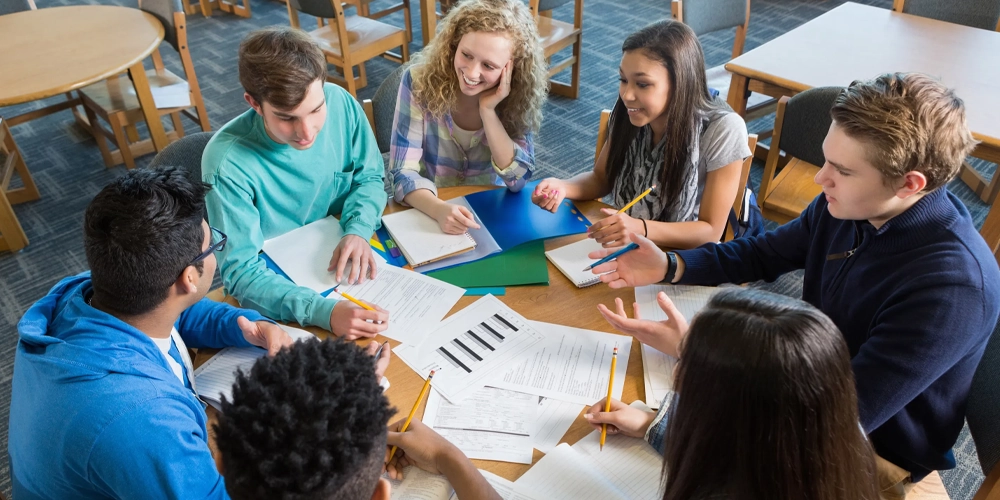
モンテッソーリ発達段階チャートと概要
モンテッソーリ発達段階を理解することは、子どもが人生の様々な段階でどのように成長し、学び、進化していくかを理解するために不可欠です。マリア・モンテッソーリの「四つの発達段階」理論は、誕生から成人期にかけて起こる特有の心理的・知的変容に焦点を当てています。
以下のモンテッソーリの 4 つの発達段階チャートは、各段階を要約し、主な特徴、学習の焦点、および教育的アプローチを概説して、理解を深めるためのものです。
| モンテッソーリ発達段階 | 年齢範囲 | 主な特徴 | 学習の焦点 | モンテッソーリ教育アプローチ |
|---|---|---|---|---|
| 第一次元(吸収力のある心) | 0~6歳 | 無意識的および意識的な吸収、感覚の探求、言語習得、運動能力の発達 | 実践的な学習、運動、自立、感情的なつながり | 実践的な生活活動、感覚材料、自主的な探究 |
| 第二の次元(推論する心) | 6~12歳 | 論理的思考、想像力、社会意識、道徳的発達 | 問題解決、グループ学習、抽象概念、批判的思考 | 共同プロジェクト、ストーリーテリング、学際的な学習 |
| 第三段階(青年期とアイデンティティ形成) | 12~18歳 | 感情的感受性、自己アイデンティティの形成、自立、社会的帰属 | 実社会での経験、リーダーシップ、経済的自立、見習い制度 | エルドキンダープログラム、メンターシップ、コミュニティ参加 |
| 第4層(成熟と社会的責任) | 18~24歳 | 自己認識、キャリアへの集中、社会貢献、長期目標の設定 | キャリアの専門化、リーダーシップ、生涯学習 | 専門的なトレーニング、メンターシップ、グローバルな意識 |
モンテッソーリの4つの発達段階の要約
- 初めての飛行機(0~6歳) 感覚学習と自立に重点を置いています。
- セカンドプレーン(6~12歳) 抽象的な推論と社会的探究を奨励します。
- 第三層(12~18歳) 自己認識と感情の発達をサポートします。
- 第4層(18~24歳) 若者をキャリア、リーダーシップ、社会貢献に向けて準備します。
このモンテッソーリ発達段階チャートを理解することで、親や教育者は、各発達段階で子供たちをよりよくサポートし、子供たちの学習体験が自然な成長パターンと一致するようにすることができます。
モンテッソーリ現代教育における発達段階
モンテッソーリ教育の発達段階は、現代の教育にも影響を与え続け、教師や保護者が発達段階に応じた学習環境を整える上で役立っています。従来の教育モデルは画一的なアプローチを取ることが多いのに対し、モンテッソーリ教育は、それぞれの子どもの自然な成長段階に合わせて、好奇心、自立心、そして実社会で役立つスキルを育みます。
モンテッソーリ発達段階の現代における応用
1. 幼児教育(第1期:0~6歳)
- 現代のモンテッソーリ幼稚園では、吸収力の高い心を育てるために感覚を豊かにする教材を使用し、実践的な学習を重視しています。
- 子どもたちは自由に動き、活動を選択し、自立を促す実践的な生活スキルを身につけることが奨励されます。
- 可動アルファベットやゴールデンビーズなどのモンテッソーリ言語・算数の教材は、将来の学習のための具体的な基礎を提供します。
2. 初等教育(第2段階:6~12歳)
- 多くの進歩的な学校ではモンテッソーリ教育にヒントを得た学際的な学習を取り入れており、子どもたちが教科書だけに頼るのではなく、興味のあるテーマを研究できるようにしています。
- プロジェクトベースの学習は、この発達段階の推論思考に合わせて、問題解決能力と協調能力を強化します。
- モンテッソーリ教育の原則に従う学校では、学習パスに柔軟性があり、子供たちが自分のペースで学習を進めることができます。
3. 中等教育(第3段階:12~18歳)
- 現実世界への応用の必要性は、起業家育成プログラム、インターンシップ、見習い制度を通じて認識されています。
- モンテッソーリ教育を取り入れた高校では、生徒が自らの教育に対してより大きな責任を持つ、自主的な学習を重視しています。
- 感情的な幸福とメンターシップ プログラムは、青少年のアイデンティティの葛藤をサポートします。
4. 高等教育とキャリア準備(第4層:18~24歳)
- 一部の大学や代替教育プログラムでは、モンテッソーリの自己動機付けと批判的思考の重視を反映して、自分のペースで体験に基づく学習を実施しています。
- モンテッソーリ教育の原則は、若者が生涯学習、国際的関与、社会的リーダーシップの役割を追求することを奨励しています。
モンテッソーリ発達段階と他の発達理論
モンテッソーリ発達段階は独自の枠組みを提供しますが、他のよく知られた子どもの発達理論と一致しています。
| 理論 | モンテッソーリ発達段階 | 比較 |
|---|---|---|
| ジャン・ピアジェの認知発達理論 | モンテッソーリの段階は、ピアジェの感覚運動段階、前操作段階、具体的操作段階、および形式的操作段階と一致しています。 | モンテッソーリ教育は総合的な発達を重視しますが、ピアジェ教育は認知プロセスに重点を置いています。 |
| レフ・ヴィゴツキーの社会文化理論 | ヴィゴツキーの「最近接発達領域」という考え方とは、子供たちに自立した学習を促すためにちょうどよい挑戦を与えるというモンテッソーリのアプローチと一致しています。 | どちらも実践的、インタラクティブ、そしてソーシャルな学習を重視しています。 |
| エリク・エリクソンの心理社会的発達理論 | モンテッソーリの段階は、エリクソンの信頼、自律、勤勉、アイデンティティ、成人の段階に対応しています。 | どちらも、学習の重要な要素として感情的および社会的成長を強調しています。 |
モンテッソーリの発達段階が今日なぜ重要なのか
- パーソナライズされた教育: 標準化された進行を強制するのではなく、個人のペースでの学習を奨励します。
- 現実世界での準備: 子どもたちが実践的な生活スキルとリーダーシップの資質を身につけるのを助けます。
- 感情的および社会的幸福: 各発達段階における感情的な課題を認識し、精神的健康と個人の成長をサポートします。
モンテッソーリ発達段階を現代の教育に取り入れることで、より子ども中心で、適応性があり、総合的な学習アプローチに移行することができます。
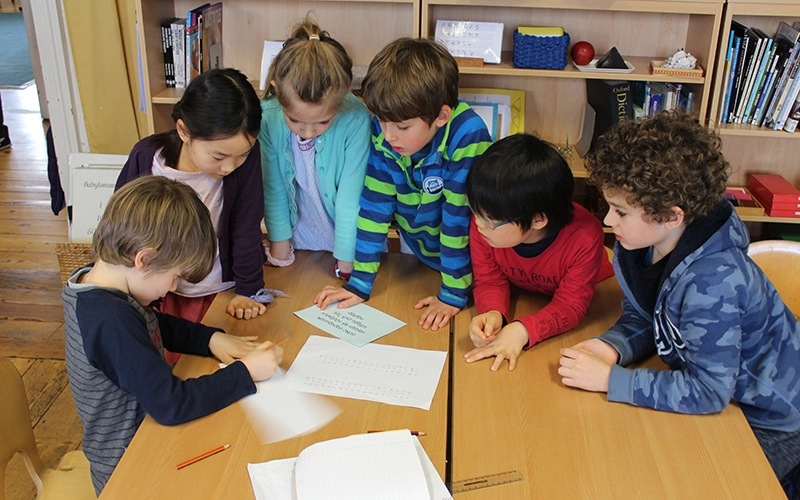
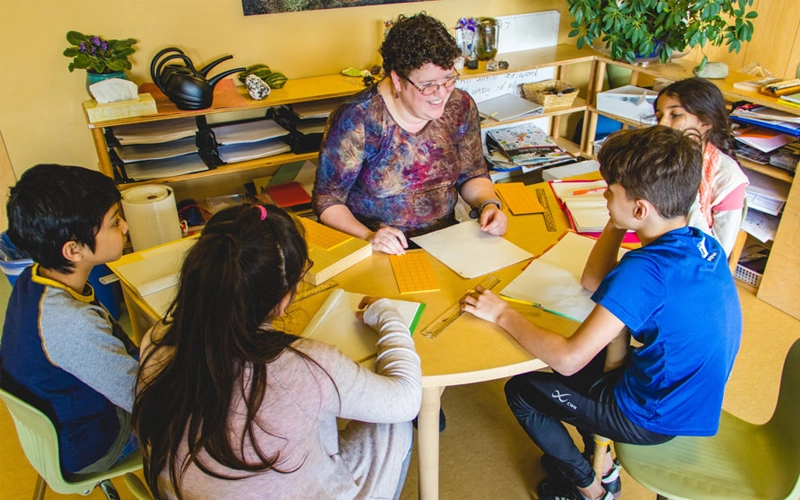
マリア・モンテッソーリのモンテッソーリ発達段階に関する知恵
マリア・モンテッソーリの子どもの発達に関する哲学は、モンテッソーリの発達段階に関する彼女の理解に深く根ざしています。これらの段階に対する彼女の観察と洞察は、現代の教育アプローチに影響を与え続け、体系的で個別化された学習の重要性を強調しています。以下は、モンテッソーリの発達段階と人間の成長の自然な流れに関する彼女の信念を裏付ける、洞察に満ちた彼女の言葉です。
吸収力のある心の力(発達の第一段階)
「子供は人類にとって希望であり、約束でもある。」
– マリア・モンテッソーリ
この引用は、生後から6歳までの子どもたちが周囲のあらゆるものを吸収する最初の発達段階における、力強い可能性を強調しています。モンテッソーリは、「吸収する心」が子どもたちに努力なしに知識を吸収させ、それが人格と知的能力を形成すると信じていました。この段階では、自立心、好奇心、そして学ぶことへの愛を育むことに重点が置かれ、子どもたちが支援的な環境の中で探求し、成長していくことを可能にします。
想像力と推論の実践(発達の第2段階)
「想像力は、人間が勇気と力を与えられ、それを使って創造するまでは偉大にはなりません。」
– マリア・モンテッソーリ
発達の第2段階(6~12歳)では、子どもたちは具体的な経験から抽象的な推論へと移行します。この段階で、子どもたちは批判的思考、想像力、そして道徳的認識を発達させます。モンテッソーリは、子どもたちの想像力の発達が創造的かつ論理的な思考を可能にすると強調しました。この時期は、問題解決、複雑な概念の理解、そして協働と探求を通して社会性を磨くことに重点が置かれます。
アイデンティティと独立性の探求(発達の第3段階)
「人生で最も重要な時期は大学で学ぶ時代ではなく、生まれてから6歳までの時期です。」
– マリア・モンテッソーリ
この引用は幼児期の発達に焦点を当てていますが、同時に、それぞれの発達段階が重要であるという哲学も反映しています。発達の3番目の段階である思春期(12~18歳)は、感情の感受性と自己同一性の探求が顕著になります。モンテッソーリは、この段階が転換点であり、子どもたちは現実世界での経験、情緒的なサポート、そして自立を築く機会を必要とすると考えました。思春期の子どもたちは、より深い社会的役割と責任を探求する準備が整い、個人の成長が優先されるようになります。
完全な自立とリーダーシップへの移行(第4発達段階)
「幼児教育の目標は、子どもの自然な学習意欲を刺激することであるべきです。」
– マリア・モンテッソーリ
第4段階の発達では、若者(18~24歳)は成熟期へと移行し、強い自己認識と社会的な責任感を育みます。モンテッソーリは、この段階における教育は、キャリア開発、リーダーシップスキル、そして社会に有意義な貢献をする能力に重点を置くべきだと強調しました。彼女のアプローチは、若者がスキルを磨き、効果的で責任ある地域社会のリーダーとなるための支援となります。
モンテッソーリの子どもの発達に関する永遠の哲学
モンテッソーリ教育は、発達の4段階を理解し、体系的でありながら柔軟な教育アプローチを提供しています。各段階は前の段階を基盤として構築されており、子どもたちが自然でありながら発達のニーズに沿った方法で成長し、学習していくことを保証します。
「子供は人類にとって希望であり、約束でもある。」
– マリア・モンテッソーリ
彼女の教えは、世界中の教育者や親たちに今もなおインスピレーションを与え続けています。子どもの潜在能力は、発達段階を理解し尊重することで最もよく育まれるということを示しています。モンテッソーリの発達段階を取り入れることで、子どもたちがあらゆる段階で成長し、その可能性を最大限に発揮できる環境を創り出すことができるのです。
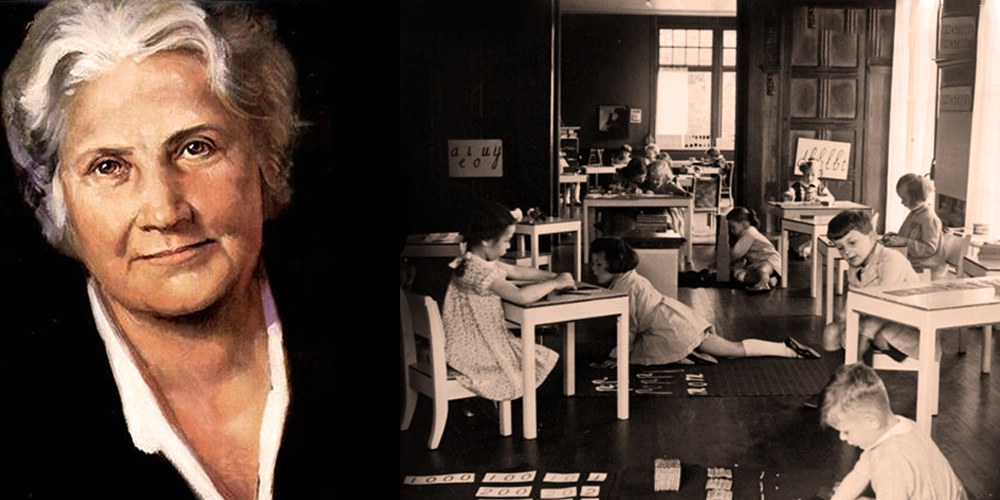
結論
モンテッソーリ教育の発達段階は、子どもの成長と学習の仕方を深く理解する助けとなります。モンテッソーリ教育の4つの発達段階を理解することで、親、教育者、そして保護者は、子どもの成長過程の各段階において適切な環境とサポートを提供することができます。マリア・モンテッソーリの子どもの発達に関する洞察は、自然な成長パターンを尊重することの重要性を強調しています。適切な教育的アプローチによって各段階を導きながら、子どもたちがそれぞれのペースで成長していくことができるようにすることが大切だと説いています。
モンテッソーリ発達段階は、発達段階の第一段階である「吸収する心」から、発達段階の四段階である「自己認識と社会責任」に至るまで、あらゆる段階における子どもと若者の固有のニーズを理解するための指針となります。第二段階である「理性的な心」であれ、第三段階である「アイデンティティ形成」であれ、それぞれの段階は学習と成長にとって重要な機会となります。
モンテッソーリ教育の発達段階の原則に基づき、好奇心、自立心、そして心の知能を育む教育体験を創造し、同時に子どもたちが大人になってからの様々な課題に備えられるよう準備を整えます。モンテッソーリ教育のアプローチは、発達は画一的なものではなく、一人ひとりに合わせて進化する一連の個別化されたステップであることを強調しています。
モンテッソーリの4つの発達段階を現代の教育と子育てに応用し続けることで、子どもたちの総合的な発達をより良くサポートし、自立した思考力、責任あるリーダー、そして思いやりのある社会の一員へと成長していくことができます。モンテッソーリの発達段階を理解し尊重することは、単なる教育ではなく、生涯にわたる学びと成長の基盤を築くことなのです。

